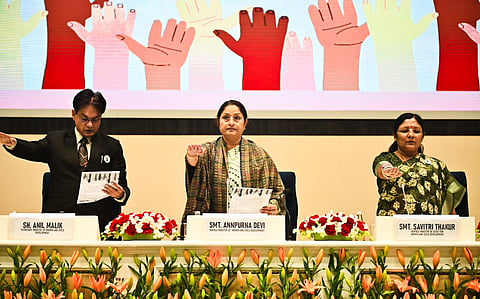

NEW DELHI: One in five girls in India is married before reaching the legal age of 18, revealed Women and Child Development Minister Annapurna Devi on Wednesday. She was speaking at the launch of the ‘Bal Vivah Mukt Bharat’ campaign, an initiative focused on eliminating child marriage across seven high-burden states where the practice remains widespread.
Highlighting that child marriage continues to be a significant challenge for India, the minister noted that approximately 200,000 child marriages were prevented in the past year.
"Child marriage is a significant challenge before us and is a practice that limits the potential of millions of girls. In our country today, one in every five girls is married before the age of 18,” she said.
Devi called for urgent collective action to make the country completely free from this social evil. She urged all states and Union Territories to draft specific action plans aimed at reducing child marriage rates to below 5% by 2029.
The campaign will prioritise seven states with the highest prevalence of child marriages – West Bengal, Bihar, Jharkhand, Rajasthan, Tripura, Assam, and Andhra Pradesh. Nearly 300 districts across India report child marriage rates above the national average.
“Child marriage is one of the most severe forms of human rights violations and is also a criminal offence under the law," Devi stated. She stressed that while the Prevention of Child Marriage Act is a key tool, “we must also focus on raising awareness because legislation alone cannot eradicate this issue.”
The minister acknowledged India’s progress, noting that the nation has contributed significantly to a sharp global decline in child marriage rates observed in South Asia.
“Figures also reveal that nearly 200,000 child marriages have been prevented in a single year,” she added, citing a United Nations report which credits India as a leading force in reducing child marriage rates across the region.
To bolster these efforts, the campaign includes the launch of the Child Marriage Free Bharat portal, a platform designed to raise awareness, report cases, and monitor progress. The initiative aligns with India’s vision of becoming a developed nation by 2047, said the minister.
Emphasising the importance of empowering girls, Devi highlighted government schemes such as Beti Bachao, Beti Padhao, Samagra Shiksha, and the Sukanya Samriddhi Yojana for their role in improving access to education and ensuring the financial security of girls.
“With the introduction of the National Education Policy 2020 and scholarships for disadvantaged groups, we are creating opportunities for girls to realise their potential," she added.
She acknowledged that deeply ingrained cultural norms perpetuate child marriage but stressed a "whole-of-government and whole-of-society approach" to overcome patriarchal attitudes.
“Patriarchal norms continue to pose challenges, but interventions like Beti Bachao, Beti Padhao have proven effective in shifting societal mindsets. With consistent efforts, we can create an enabling environment for our girls," she said.
She further noted that initiatives like Nari Adalats, gender-inclusive communication guides, and safe-city projects under the Nirbhaya Fund aim to address patriarchal norms and ensure women’s safety and security.
Despite these achievements, the minister cautioned against complacency. “We cannot stop until India is completely free of child marriages,” she said, calling for active participation from citizens.
“I urge everyone to take a pledge to ensure no child marriage takes place in their community. Together, we can achieve this vision of a developed and equitable India."
A UN report released earlier this year estimated that more than one-third, or 200 million, of India’s female population was married off during childhood.
According to the Sustainable Development Goals Report 2024, one in five girls in India is married before turning 18, compared to one in four 25 years ago. However, issues such as violence against women and the lack of autonomy over sexual and reproductive health persist, the report said.